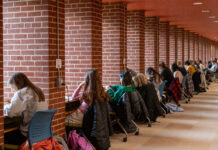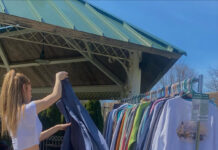The Women’s Center hosted a virtual Rock Talk: Living with a disability in today’s America on their Youtube page, with current students and alumn of The Women’s Center sharing their stories.
From invisible disabilities to ones that are more known, five stories were shared about what it is like to live with a disability.
Maggie Calvert, a senior political science, philosophy and gender studies major, kicked off this series with her story, explaining how she does not seem disabled or fit the character.
“The disability does come out from time to time for people to see,” Calvert said. “It’s invisible until it’s not, and when it does take over, everybody gets to see it because I do fall down a lot.”
Calvert said that her disability can strain her relationships as she sometimes struggles to control the autonomy of it. Safety plans are in place for friends of Calvert if she happens to fall or have a seizure, but always checks on her friends afterwards and apologizes.
“I know that I shouldn’t be apologizing, but we live in a society that has made me and so many other disabled people feel like they’re a burden for needing a little bit of extra care or accommodations,” Calvert said.
Similar to Calvert, Erin O’Connor, a graduate assistant for The Women’s Center and Pride Center and graduate student pursuing her masters in student affairs and higher education, also has what she would describe as an invisible disability.
In the winter of 2018, O’Connor was diagnosed with narcolepsy without cataplexy.
“On the outside, I’m completely fine and I’ve come to learn that this is both a blessing and a burden,” O’Connor said. “In most social situations I’m not treated any differently. In my workplace and classes I’m treated the same, but this also means that I’m expected to function at a normal level and this can really be challenging for me.”
O’Connor said that she could sleep for seven or eight hours a night and still wake up feeling like she had not slept at all.
“We live in a very fast paced society that really prioritizes success, achievement and independence and I have a disability that recommends me taking daily naps, sticking to a really regulated sleep schedule, and really lessening the stress that’s on my body,” O’Connor said.
O’Connor feels that sometimes her disability has not been seen as a concern or taken seriously because she can still achieve at a high level. She often questions how graduate school would have been if she did not have the diagnosis.
“A lot of the times it’s the lack of validation or accommodation that can really be enraging,” O’Connor said. “People every day are dealing with things that we can’t see or don’t understand, but that doesn’t make their experience any less real.”
Other students shared their stories on the platform as well. Kelsey DeClaudio, a recreational therapy and gender studies major, explained that she has tethered spinal cord syndrome, the reason she personally identifies as disabled.
“You know you’re going to face stigma and you’re going to face stereotypes, and discrimination in the architectural and the attitudinal barriers out there are very prevalent,” DiClaudio said.
DiClaudio said that there are bad days when she knows that she is getting stared at or people ask her inappropriate questions.
“I would really like to not recognize all the hardships, but I like to be realistic about it too,” DiClaudio said. “This is going to be a continued journey for me and I know it’s not always going to be easy, but at the end of the day I know I’m going to sleep disabled and wake up disabled, and I have to be okay with that.”
DiClaudio said that she would have never been able to experience so many great things if it was not for her disability, such as being part of the Women’s US National sled hockey team.
Another student found great experiences and friends through sled hockey as well. Erik Knotts shared his story after contracting bacterial meningitis at 18 months and becoming a bilateral above the knee amputee.
Knotts said that he received a lot of support from his family, but that they also taught him from a young age that he needed to do things for himself on his own.
“I think that has been a great help to me living in America with a disability,” Knotts said. “Every day with a disability is going to provide new challenges, some you’re ready for, some you’re not, but you have to just learn how to take those.”
The most difficult obstacle for Knotts was growing up in middle school and trying to play sports with his friends.
“[I’ve] learned how to adapt in different ways from my friends from sled hockey who also have disabilities,” Knotts said.
Slippery Rock alumn even spoke on the topic.
Francine Maitland, a 2009 alumn, has been living with a disability for the past 25 years, since she was 10.
Maitland said that if she were to explain her medical history, those listening would need a medical degree to understand and her doctors joke that they have the degrees and still do not understand.
“We might need different accommodations and live in different embodiments mentally and physically, but we are still human and worthwhile and beautiful and I think that bears repeating in the time of the pandemic,” Maitland said.
Maitland said that she advocated for better access and more awareness to disability issues when she was a student. She said that she did not want anyone else to go through the same challenges that she did.
During the time of the pandemic, Maitland encourages others to practice empathy, such as by watching YouTube videos about a disability or to follow a new Instagram on someone that is disabled.
“Rethink person first language and your use of it,” Maitland said. “Talk to someone with a disability and ask them what their favorite color is, what book they read lately, or what their favorite TV show is.”









